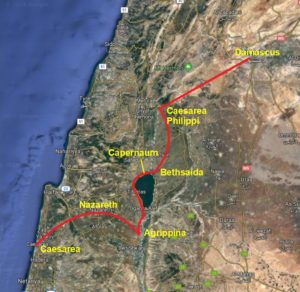The Ministry of Jesus in Galilee
Mark 1:16—8:30
A New King (1:16—3:6).
Kingdom is Near (1:15)
Popularity (1:16-45).
Forgiving and Healing a Paralytic (2:1-12).
Eating with Tax Collectors and Sinners (2:13-17).
Jesus retreated to the sea (2:13).
Wherever He went, people followed.
But He still took this opportunity to teach the people.
He was likely also traveling along the Great West Road.
This road went from Damascus to the Mediterranean and went through Capernaum.
This is where He encounters a tax collector.
Who were the tax collectors? (2:14).

They were hated among the general populace.
They were often seen as collaborators with their Roman overlords.
Not only that, they had the ability to lie to the tax payers about how much they owed. They would pay Rome what was owed and pocket the rest, though we do not know if Levi did this.
In this case, Levi was operating a toll booth on the Great West Road.
This was not a “tax office” as we might think of it, but more like a toll booth.
These taxes did not go to Rome, but to Herod Antipas their tetrarch.
But that wouldn’t endear him to the Jews much either.
He was the son of Alphaeus.
He might also be the brother of James the son of Alphaeus, but this is uncertain.
He was a tax collector.
Mark and Luke call him Levi, while Matthew calls him Matthew.
In the list of apostles in Mark 3:16-19, he is called Matthew.
It is possible that after he was called, Levi had his name changed to Matthew as Simon’s was changed to Peter.
Matthew is Aramaic for “gift of God.”
He was called by Jesus (2:14).
Someone actually paid attention to him.
More than that, He spoke kindly to him—this famous Jesus of all people!
Even more than that, He wanted him to follow Him—Levi left his lucrative job right there.
And then, He went to his house and ate with him and his friends.
Since tax collectors were hated, Levi likely had very little other friends outside of the outcasts of society, other tax collectors and sinners.
How would you describe Jesus here? Kind and loving.
Who were these sinners? Three possibilities (2:15-17).
They could be people deadset on sinning, doing so willfully without repentance.
If this is true, would it make sense for Jesus to fellowship with them?
If they sinned willfully without repentance, would they listen to Jesus?
Some might, but many would remain hard-hearted (Luke 7:36-50).
They could be those who simply did not follow the tenets of the Pharisees.
This may be more likely, since the Pharisees were among those questioning Jesus.
Non-Pharisees would be more likely to listen to Jesus if they were still righteous by comparison.
The Pharisees would have classified Jesus as a sinner since He did not follow many of the Pharisaic traditions.
Simply those who opposed their view of God’s will.
Jesus is using it to refer to people other than who the Pharisees meant.
Later we note that He does also eat with Pharisees (Luke 7:36ff; 14:1ff).
We see then that we are all sinners in need of salvation (Rom. 3:10, 23).
How can we safely emulate Christ in His example here? (2:15-17).
This passage is used to justify all manner of things.
The danger here is being influenced by the sinners to sin (1 Cor. 15:33).
Some suggestions:
Keep the conversation on wholesome things.
You are not partying with them, merely having a meal and discussing spiritual things (we’re not going to a bar necessarily, but perhaps the bartender’s house).
Know your limits—if things get too out of hand, excuse yourself.
Limit your time around them if you need to.
If their intentions are pure, they will respect your boundaries.
Remember your goal: you are far less likely to convert someone unless you are willing to talk with them (perhaps over a meal).
The scribes and Pharisees asked the disciples about it, and when Jesus heard about their question, He responded directly to them (2:15-17).
This reminds me of a phrase I heard a number of years ago: “The church is not a hotel for saints but a hospital for sinners.”
A hotel is used for leisure while on vacation.
A hospital is used to heal people and help them get better.
We are all in need of help, perhaps some more than others.
Jesus did not come to call the righteous, or perhaps self-righteous.
He came to call sinners because only sinners recognize their need for a Savior.
Since all have sinned, He has come to call everyone!
Recall: the church literally is the “called out ones.”


